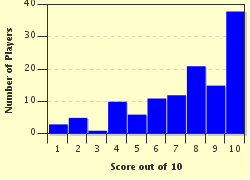Quiz Answer Key and Fun Facts
1. Genesis 2:10-11,13-14 states, "A river watering the garden flowed from Eden; from there it was separated into four headwaters. The name of the first is the Pishon; it winds through the entire land of Havilah, where there is gold. The name of the second river is the Gihon; it winds through the entire land of Cush. The name of the third river is the Tigris; it runs along the east side of Ashur. And the fourth river is the ______."
What is the name of the fourth river?
2. Which descendent of Abraham was described this way: "his whole body was like a hairy garment"?
3. Exodus 2:18-19 - "When the girls returned to Reuel their father, he asked them, 'Why have you returned so early today?'
"They answered, 'An Egyptian rescued us from the shepherds. He even drew water for us and watered the flock.'"
Who was this Egyptian?
4. Which of these biblical characters does not have their own Old Testament book?
5. The book of Ecclesiastes is commonly believed to have been written by which King of Israel?
6. Which of these biblical events was *not* accompanied by an earthquake?
7. Philip the Evangelist met a eunuch on the road from Jerusalem to Gaza, whom he helped to understand a passage from the book of Isaiah. From where did this eunuch come?
8. Many of the books of the New Testament are 'epistles', or letters that have been written to individuals or groups. Which of these is *not* an epistle?
9. In Paul's second letter to Timothy, he named Timothy's mother and grandmother, citing their legacy of faith. His grandmother's name was Lois - who was his mother?
10. What is the definition of eschatology?
Source: Author
reedy
This quiz was reviewed by FunTrivia editor
CellarDoor before going online.
Any errors found in FunTrivia content are routinely corrected through our feedback system.

